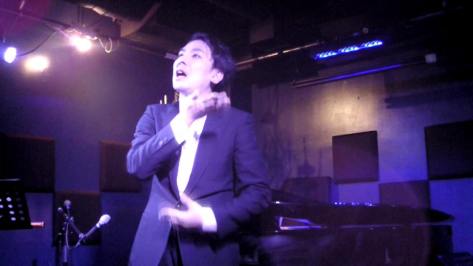これはジョン・ネイサンの書いた、僕にとっては一つの思い出の本。この表紙に写っている写真のほんの数週間前に、両親と共に三島由紀夫と会った事があった。1970年に、約一ヶ月間、僕と母と義父と共に日本に滞在した時があった。僕にとっては幼稚園と小学校の頃では、唯一日本に来日した時だった。夜、あるパーティーで三島由紀夫は、篠山紀信の取った彼の写真を見ながら、どれを使うかを選んでいた。そして、僕の母にもアドヴァイスを聞いていた。
ジョン・ネイサンの翻訳した三島由紀夫の小説と彼の伝記が、僕にとって初めて読んだ日本文学だった。ジョン・ネイサンと彼の日本人の妻で絵描きの小田まゆみは、当時三島由紀夫と親しく、ジョン・ネイサンの翻訳する三島の小説はアメリカやヨーロッパで知られていた。三島由紀夫はアメリカの小説家エドガー・アラン・ポーやオスカー・ワイルド等の影響も受けていて、とても読みやすかった。西洋文学を読む時と感じ方で読めるものだった。そうした小説は少くなかったと思う。三島由紀夫と寺山修司の文学は西洋文学の影響もありながら、僕にとって美しく自然に聴こえる日本語の響き方で書かれていた。寺山修司はそうした三島由紀夫の言葉の使い方にとても影響を受けていたと聞く。
2000年代では、三島由紀夫と寺山修司の書いた文学を朗読しながら演奏する曲を、いくつか演奏していた。TZADIKから発売されている『AOI』もステージでは、三島由紀夫の近代能楽集の『葵の上』から朗読をいれたり、僕のコンサート『ドビュッシー・パート 2』ではドビュッシーが作曲したのダヌンツィオの『聖セバスチァンの殉教』から三島由紀夫の翻訳を朗読したりした。
三島由紀夫は政治思想に興味を持つタイプの人ではなかった。60年代の初めころに、ある雑誌で、当時の天皇陛下が殺されてしまう小説が載ると、右翼の活動家達に三島由紀夫がきっと、その小説を推薦したに違いないと間違われ、命を狙われてしまう時期があった。しかし、その後、60年代の後半に向かって、彼は自分の作った”愛国主義者”キャラクターを演じるようになってしまった。ジョン・ネイサン、イアン・ブルマ、コリン・ウイルソン等は三島由紀夫についてそのように見ている。
イアン・ブルマは三島由紀夫について、次のように書いている: “Mishima was in almost every respect an oddity, and it is dangerous to think to see him as typical of anything…Dandies are life’s practical jokers who must fool people into thinking they are something they know themselves they are not. They are like exhibitionists who feel alive only when they are watched.”
そして、1970年に切腹をしてしまう直前に出版に届けて最後の小説『天人五衰』のエンディングは、僕にとってシェークスピアのマクベスの次のセリフを思い起こせるようなものだった:
Life’s but a walking shadow, a poor player
That struts and frets his hour upon the stage
And then is heard no more: it is a tale
Told by an idiot, full of sound and fury,
Signifying nothing. (「人生はしょせん歩く影、憐れな役者/……/白痴の語る物語、響きと怒りに満ちてはいるが/何を意味するわけでもない」
三島由紀夫の演じた芝居の終幕だった。
三島由紀夫が学生運動家や社会運動家、政治思想家についてよく語っていた一つの意見は正しかったと僕は思う。多くの日本の左翼系の社会運動家が言っている事は、右翼的だった。僕が見てきた左翼系の社会運動家もみんなそのように見える。アメリカで僕が見た60年代え学生運動をやっている人たちとは全然別のものだった。アメリカでは、音楽映画『ウッドストック』、『イージー・ライダー』、そして多くのロック・バンドの歌っているのは本当のデモクラシーを求めていたものだった。アメリカでは、政府が言っているほどの本当のデモクラシーにまだなっていない、と多くの学生は語り。『我々の世代がそれを変える』、という主張が強かったと思う。
日本の学生運動家は基本的に反米主義だった。アメリカを帝国主義の敵国と見て、デモクラシーよりも最初はスターリニズム、後には文化革命当時の毛沢東思想が流行っていた。どちらかというと軍国主義的な全体主義の国を棚に上げていた。そして、日本の左翼系の社会運動家の多くはアジアの運動家との連帯も求めていた。三島由紀夫も語っていたことだが、こうした考え方をしている人は、内心では右翼化しているのだが、それがカッコウ悪いと思ってしまうから隠しているように僕にも見える。
今でもそうだが、日本で育って、アメリカやヨーロッパに行って、うまくコミュー二ケーションが取れなく、仕事で失敗して日本に帰ってくると政治的になってしまう人が一部にいる。それは自分が社会でうまく出来なかった事を隠すことでもあったりもする。そうした人は反米主義者になったり、アジアの社会運動家との反米主義的な連帯を唱えたりする。中には右翼もいるが、左翼の仮面をかぶったカクレ右翼もいる。
こういう人たちの事を三島由紀夫は見抜いていたのだと思う。




